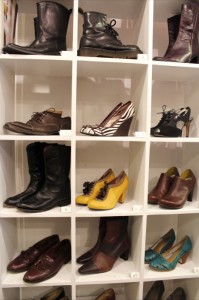That recent shopping spree in Vancouver wasn’t good for your wallet, and it also wasn’t good for your closet space. Trying to cram 10 new articles of clothing into an already packed closet generally leads to disarray. Maybe they will fit in the dresser? Fat chance: the drawers are overflowing and won’t even close.
The sad truth is that it’s time to part with some of your old clothes. Like that pair of leather boots you got on sale that are slightly too tight in the toe. Or that dress you wore to your high school’s winter formal that’s never going to be worn again. But the memories that live inside the dress might be too much to leave at the end of your driveway in a crumpled-up garbage bag waiting to be picked up by Big Brothers and Big Sisters.

“Your clothes are worth enough so you’re not just going to throw them away or give them to a thrift store,” says Kirsten Wright, owner of Regalia Boutique in Fan Tan Alley. “If you’re never going to wear it again, what good is it doing just taking up space in your closet and in your life?”
This is where consignment, or selling clothes to a secondhand store, is an especially good idea.
“Some people just want to get rid of their stuff,” says Wright. “Other people have more of an attachment or a collection or something they know the value of and want a certain amount. Consignment lets you get rid of your clothes in a controlled way: you know you’re going to get something for it.”
Some stores will buy clothes outright and only consign more expensive items or items that might be tricky to sell. Most stores in Victoria offer consignors 40Đ50 percent of the final retail price.
It’s important to have a look around the consignment shop before you consign your clothes so you match the culture of the business.
“Every store is different,” says Linsay Doucette, manager of Leche’s Clothing in Oak Bay. “Find out what the demographic of the store is and try and match it to what you’re consigning.”
Apart from thrift-store shopping, consignment is the greenest form of fashion consumerism. By buying gently used clothing the consumer avoids the shipping and production pollutants.
“There are so many clothes in the world and consignment is a great way to recycle them,” says Wright. “Consigning clothes reduces waste because you’re putting them somewhere where you know they’re going to get the maximum chance of being reused. Too many clothes get thrown into the dump.”
So take your freshly laundered clothes to a consignment store that fits your style to make some money so you won’t feel as bad when you go on your next shopping spree.
